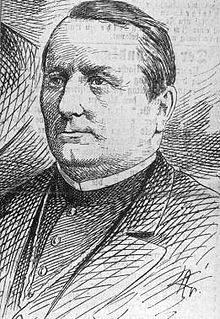Alexander Karl
Alexander Karl OSB (born March 19, 1824 in Grund , Wullersdorf , Lower Austria ; † February 1, 1909 in Melk ) was an Austrian Benedictine and politician. From 1875 until his death he was the 62nd abbot of Melk Abbey and from 1878 to 1908 he was a member of the Lower Austrian state parliament for a total of five legislative periods and, from 1876, a member of the Reichsrat .
Life
Karl was born in Grund, a village near Wullersdorf, as the son of a wealthy landowner and attended a high school in Znaim . He studied theology and philosophy at the University of Vienna and joined Melk Abbey in 1844. There he made his perpetual profession in 1848 and was ordained a priest in 1849 . He then became a professor of morality and Greek at the Melker Stiftsgymnasium . From 1857 to 1862 Karl Adjunkt was in the post of court master at the monastery in Vienna and as such was involved in the planning for the construction of the Melkerhof in Josefstadt (not to be confused with the older Melkerhof in Schottengasse). After his return he became a treasurer , cellarius and construction and garden director of the monastery. In 1867 he took over the parish in his home parish of Wullersdorf, and in 1875 he was elected abbot by the convent.
In 1870 he ran for the first time unsuccessfully for the state parliament, in 1878 he was elected as a member of the large estates . With this mandate he stayed in the state parliament from September 24, 1878 to September 15, 1890, when he was able to win the rural community mandate of St. Pölten . However, he lost this after only one legislative period in 1896, after which he was again a member of the large estates until 1908. From 1880 to 1884 he was also Deputy Land Marshal. He was represented in the manor house of the Austrian Imperial Council from 1876. Karl was a member of the liberal constitutional party , and his political views aroused astonishment in church circles. He was particularly concerned about the economic concerns of the city and the monastery, and lacked a deep understanding of the reform efforts within the order.
He was a founding member and from 1896 president of the Association for the Protection of Austrian Viticulture . When phylloxera first appeared in Austria, he had the monastery wineries in Gumpoldskirchen and Baden planted with refined American vines, thus setting an example for other winegrowers. The Abt-Karl-Gasse in Vienna- Währing and the Abt-Karl-Strasse in Melk (December 5, 1896) were named after him in 1887 .
Web links
- Karl, Alexander (1824–1909), religious. In: Austrian Biographical Lexicon 1815–1950 (ÖBL). Volume 3, Publishing House of the Austrian Academy of Sciences, Vienna 1965, p. 235 f. (Direct links on p. 235 , p. 236 ).
- Biographical data of Alexander Karl in the Biographical Handbook of the Lower Austrian Parliament 1861–1921
- Entry on Alexander Karl in the Austria Forum (in the AEIOU Austria Lexicon )
- Karl, Alexander (1824–1909) on geschichte-des-weines.de
| predecessor | Office | successor |
|---|---|---|
| Clemens Moser |
Abbot of Melk Monastery 1875–1909 |
Amandus John |
| personal data | |
|---|---|
| SURNAME | Karl, Alexander |
| BRIEF DESCRIPTION | Austrian chaplain, abbot and politician, member of the state parliament |
| DATE OF BIRTH | March 19, 1824 |
| PLACE OF BIRTH | Grund (Wullersdorf) |
| DATE OF DEATH | February 1, 1909 |
| Place of death | Melk |

